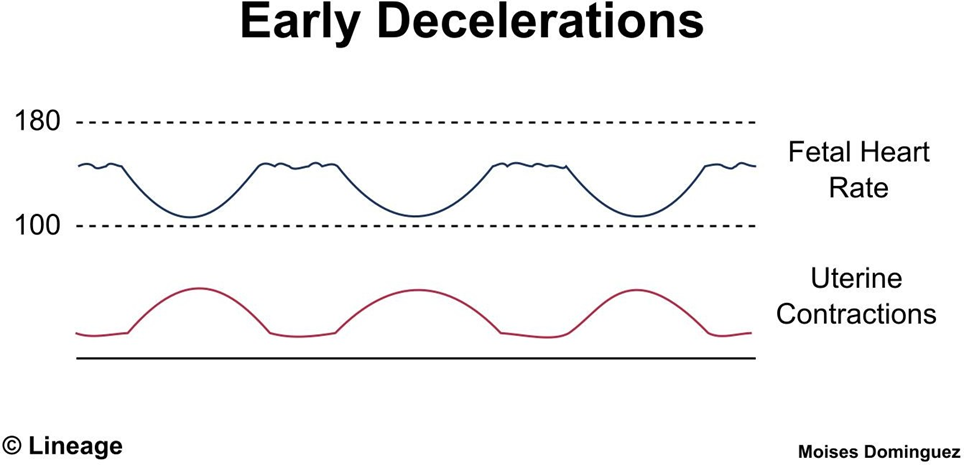A nurse is caring for a client who is in labor and receiving electronic fetal monitoring. The nurse is reviewing the monitor tracing and notes early decelerations. Which of the following should the nurse expect?
Head compression
Fetal hypoxia
Abruptio placentae
Postmaturity
The Correct Answer is A
A.
A. Early decelerations are typically benign and occur in response to head compression during contractions. They mirror the uterine contractions and are not associated with fetal distress.
B. Fetal hypoxia is associated with variable or late decelerations, not early decelerations.
C. Abruptio placentae is a medical emergency characterized by premature separation of the placenta from the uterine wall, which can lead to late decelerations due to fetal hypoxia.
D. Postmaturity is a term used to describe a pregnancy that extends beyond 42 weeks gestation and is not directly related to fetal heart rate patterns during labor.

Nursing Test Bank
Naxlex Comprehensive Predictor Exams
Related Questions
Correct Answer is C
Explanation
A. Holding the newborn in an en face position: This action promotes bonding between the mother and the newborn and is a positive interaction.
B. Asking the father to change the newborn's diaper: Involving the father in caregiving tasks fosters family involvement and bonding.
C. Viewing the newborn's actions to be uncooperative: This suggests a negative perception of the newborn's behavior, which could indicate potential issues with bonding or misunderstanding
infant cues, requiring the nurse's intervention.
D. Requesting the nurse take the newborn to the nursery so she can rest: While rest is important for the mother, separating the newborn from the mother could disrupt bonding and breastfeeding, so this action should be discussed further with the client to explore other options.
Correct Answer is A
Explanation
A.
A. Gastroenteritis can lead to dehydration and electrolyte imbalances, which can cause lethargy and confusion. This indicates a potentially serious condition requiring immediate attention.
B. While cystic fibrosis requires management, the symptoms described (thick, productive cough and thirst) are not immediately life-threatening.
C. Sickle cell anemia pain is significant but may not require immediate intervention if the client has just received analgesia and is being monitored.
D. While a morning fasting capillary glucose of 185 mg/dL is elevated in a client with diabetes mellitus, it does not require immediate intervention unless accompanied by symptoms of hyperglycemia such as confusion or lethargy.
Whether you are a student looking to ace your exams or a practicing nurse seeking to enhance your expertise , our nursing education contents will empower you with the confidence and competence to make a difference in the lives of patients and become a respected leader in the healthcare field.
Visit Naxlex, invest in your future and unlock endless possibilities with our unparalleled nursing education contents today
Report Wrong Answer on the Current Question
Do you disagree with the answer? If yes, what is your expected answer? Explain.
Kindly be descriptive with the issue you are facing.
